| List of French flags |
|---|
 |
This is a list of flags of Île-de-France, including symbolic national and sub-regional flags, standards and banners used exclusively in Île-de-France.
| List of French flags |
|---|
 |
This is a list of flags of Île-de-France, including symbolic national and sub-regional flags, standards and banners used exclusively in Île-de-France.
| Flag | Date | Use | Description |
|---|---|---|---|
 | 14th century (de facto) | Traditional flag of Île-de-France | Three gold Fleur-de-lis on a solid-blue background. Same as the Kingdom of France. [1] This symbol, three gold Fleur-de-lis on a solid-blue background, is a banner of the former royal coat of arms of France, the king historically being the direct lord of Île de France (as the core of his royal demesne). [2] [3] [4] [5] |
 | 10 October 2005 | Regional council flag of Île-de-France | White flag with the regional council logo. [1] |
| Flag | Date | Use | Description |
|---|---|---|---|
 | Flag of Essonne | Banner of arms. | |
 | Flag of Hauts de Seine | Derived from a proposition of coat-of-arms. Never adopted but used culturally. | |
 | Flag of Paris (Registered by the French Society of Vexillology) [6] | A blue and red vertical bicolor with the coat of arms [7] | |
 | Flag of Seine-et-Marne | Derived from a proposition of coat-of-arms. Never adopted but used culturally. | |
 | Flag of Seine-Saint-Denis | Derived from a proposition of coat-of-arms. Never adopted but used culturally. | |
 | Flag of Val-de-Marne | Derived from a proposition of coat-of-arms. Never adopted but used culturally. | |
 | Flag of Yvelines | Banner of arms. |

The national flag of France is a tricolour featuring three vertical bands coloured blue, white, and red. The design was adopted after the French Revolution, whose revolutionaries were influenced by the horizontally striped red-white-blue flag of the Netherlands. While not the first tricolour, it became one of the most influential flags in history. The tricolour scheme was later adopted by many other nations in Europe and elsewhere, and, according to the Encyclopædia Britannica has historically stood "in symbolic opposition to the autocratic and clericalist royal standards of the past".
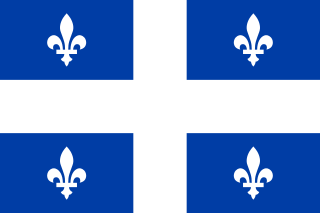
The flag of Quebec, called the Fleurdelisé in French, represents the Canadian province of Quebec. It consists of a white cross on a blue background, with four white fleurs-de-lis.

The national flag of Algeria consists of two equal vertical bars, green and white, charged in the center with a red star and crescent, a symbol of Islam as the nation's prominent faith. The flag was adopted on 3 July 1962. A similar version was used by the Algerian government in exile from 1958 to 1962. The Western blazon is per pale vert and argent; a crescent and star gules.
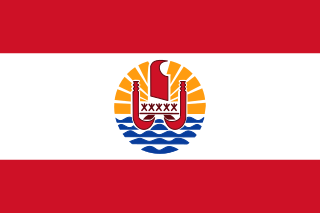
The flag of French Polynesia was adopted in 1984. According to the articles of adoption, the flag of French Polynesia must be displayed with the French tricolor, and may be displayed with the flags of the component archipelagos. The French Polynesian flag must be displayed to the left of the French flag, and the flag of the archipelago must be displayed to its right.
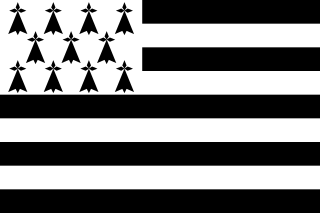
The flag of Brittany, a region in the northwest of France, is called the Gwenn-ha-du, which means white and black, in Breton. The flag was designed in 1923 by Morvan Marchal. It is also unofficially used in the department of Loire-Atlantique, although this now belongs to the Pays de la Loire and not to the region of Brittany, as the territory of Loire-Atlantique is historically part of the province of Brittany. Nantes, its prefecture, was once one of the two capital cities of Brittany.

The flag of the Marquesas Islands is the flag chosen by the regional government to represent the islands. However, it is not formally recognized by France, the administrative government of the region.

Luçon is a commune in the Vendée department, Pays de la Loire region, western France. Its inhabitants are known as Luçonnais.

The Kroaz Du is a flag of Brittany, used as an emblem of the independent duchy in the late Middle Ages. In the Breton language, kroaz means cross and du means black.

The flag of Martinique consists of a red triangle at the hoist, with two horizontal bands, the upper green and the lower black. It was adopted on 2 February 2023. The flag of France, its parent country, is also flown with official standing due to Martinique's status as a French overseas department and region. The assembly of Martinique flies a flag with the collectivity's logo on it to represent the government.

Two flags are in use in New Caledonia, an overseas territory of France. Up to 2010, the only flag used to represent New Caledonia was the flag of France, a tricolour featuring three vertical bands coloured blue, white, and red known to English speakers as the French Tricolour or simply the Tricolour. However, in July 2010, the Congress of New Caledonia voted in favour of a wish to fly the Kanak flag of the independence movement FLNKS alongside the French Tricolour. The wish, legally non-binding, proved controversial. A majority of New Caledonian communes, but not all, now fly both flags, the rest flying only the French Tricolour.
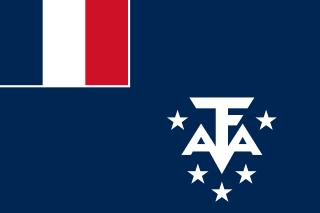
The flag of the French Southern and Antarctic Lands is a flag representing the overseas territory of France consisting of Adélie Land, the Crozet Islands, the Kerguelen Islands, Saint Paul and Amsterdam Islands, and the Scattered Islands. The flag was adopted on 23 February 2007.
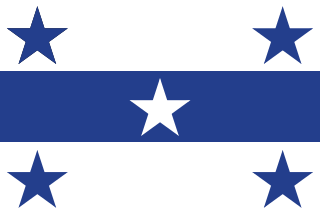
The Flag of the Gambier Islands is the flag of the Gambier Islands of French Polynesia in the Pacific Ocean, administered by France. It was created in 1832 and adopted in 1837.

The flag of Carillon was flown by the troops of General Louis-Joseph de Montcalm during the Battle of Carillon, which was fought by the French and Canadian forces against those of the British in July 1758 at Fort Carillon.
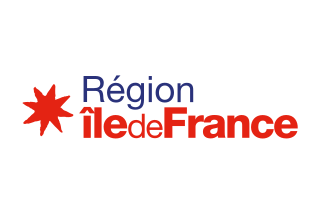
Île-de-France has no official flag and coat of arms other than using the logo of the Île-de-France government. The royal coat of arms of France, three gold Fleur-de-lis on a solid-blue background, used to serve as the coat of arms of the Province of Île-de-France before it was dissolved 1790 during the French Revolution. It is still used as a cultural coat of arms.

The Council of Heraldry and Vexillology is the Heraldic authority for the French-speaking Community of Belgium. It is the institution that advises the Government of the French-speaking Community on all matters concerning civic, personal, and familial arms and flags. Grants of arms from the Council are published in the Belgian official journal.
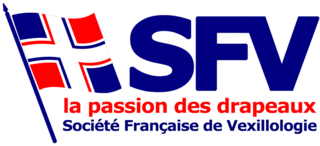
The Société française de vexillologie, or SFV, is a free, non-profit association of vexillology and heraldry enthusiasts of France. The centre aims principally at promoting the study of the history, symbolism and usage of flags, and preserving related documents. It was founded in 1985 in Paris and is a FIAV member since 1991.